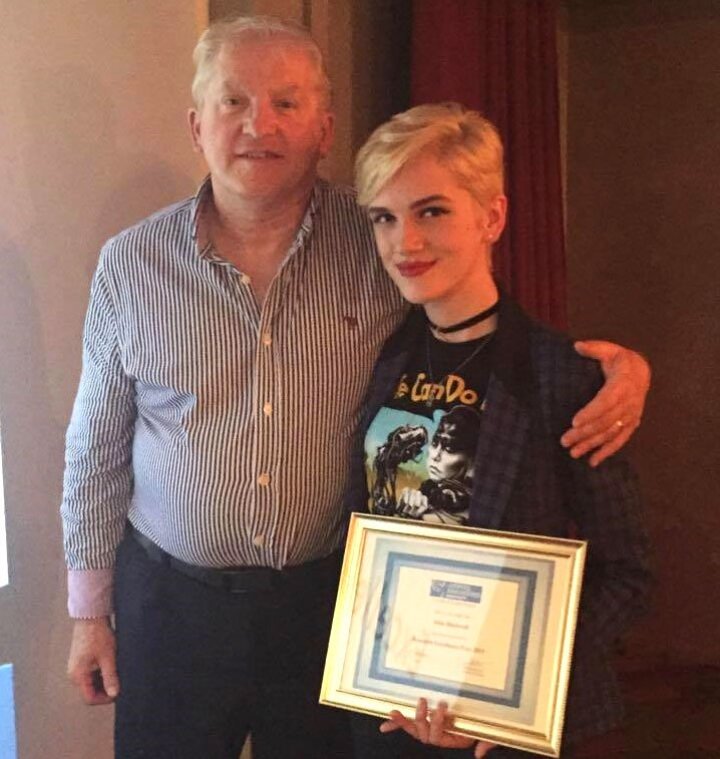Grads of the UK is an Instagram project and series of articles run by graduates, for graduates. We are documenting what being a millennial in 2017 is really like, with honest stories about life after university.
Every week we hand over our Instagram account to a new grad and share their unique story here on GradTouch. This week Julia is taking over. Julia finished her Creative Writing and Film Studies degree in 2015 and now works as an Educational Support Assistant.
You can read the story Julia has written below, and see more daily insights into her graduate life by following @gradsoftheuk on Instagram.
I was born with a number of congenital conditions: Spinda Bifida Occulta (a condition usually found in the lower part of the spine, which affects the development of the spinal nerve roots and spinal cord); spinal syrinx (a fluid filled cavity in the spinal cord); and short bowel syndrome (a malabsorption disorder caused by a lack of full functional intestine). I now live with an ileostomy bag, I self-catheterise and I wear a splint on my lower right leg. I was born with these conditions, so I never had a problem with them up until high school, when I was targeted for my visible disability: a leg splint. I began trying to hide my disability where possible and, when asked, I’d lie about the nature of my more intimate operations. As most of my impairments are hidden, I grew up doing all I could to keep the fact I was disabled covered and to deny the label. University turned that around. Now, I’ll tell anyone anything, and I think that’s largely down to what I learnt researching and writing my dissertation. I discussed The Hunchback of Notre Dame, Finding Nemo and How to Train Your Dragon, using a variety of film, psychology, disability and medical journals for my research. It was stressful to complete, but I can’t think of many things in life I’ve enjoyed so much. My confidence began to build as I researched various narratives of disability. When I was younger I would constantly search magazines and television for disabled people and rarely come across an image that made me feel proud of who I was. At uni, I felt increasingly enraged, rather than embarrassed, by these narratives. Choosing that dissertation topic led to the realisation I wanted a career that involved disability and the chance to make a difference to how disability is represented in society. After my dissertation, Disability was added into the Film Theory module as an area of study – something I am still very proud of. I was also invited back to present a lecture on my dissertation to the new first years after my graduation and was awarded a Research Excellence Prize. Initially, I worked as a carer for adults with learning disabilities. I went into the role with the hope of keeping it up for a year, but I realised care work wasn’t for me and handed in my notice after a total of eight months in the role, having received a job offer to help out in classes at my old school. Now, I work as an Educational Support Assistant with students who have support needs across a variety of subjects at Foundation, GCSE and BTEC Level. My role primarily involves guiding students through their work and keeping them on task. It is incredibly rewarding – I love being in an Education environment and it’s great when you see an improvement in the people you’re working with. I have decided an academic, research-focused route is probably best for me in the long term, and recently I discovered a Media Psychology MSc that seemed perfect. After a couple of meetings with the lecturers, I felt as though the course would not only be very interesting, but also a step towards the area I would like to research and work with, as I plan to go on to study how disability is represented in the media and how this affects disabled people. I have been accepted onto the course to start in September. I’m really nervous about it, but I hope the course will give me the chance to have an impact on the positive change that is already beginning in disability media, especially when it comes to the representation of young, disabled women. I hope to work on something that will show them they are not alone in their conditions by bringing more positive images and discourses of disabled women into the mainstream media. I have no idea exactly what will happen during the course or what my opinions or options will be at the end, but that’s what I like about studying and learning. A dissertation is often presented to people as a gruelling and almost impossible task to complete. Mine was not only a lot of fun, but has also proven key in building my self-confidence and helping me discover what I want as a career. My advice to anyone about to start theirs would be to pick something you enjoy and start researching early. It could become a lot more than a piece of coursework. Julia is running the @gradsoftheuk Instagram until Saturday 22nd April. 
My dissertation was titled ‘Impairment and Disability in Animated American Family Film’.

Since then, I’ve been trying to build up my experiences with different disabled people so that my perspective is not simply limited to my own.
Throughout my work so far, though I love what I do, my mind still regularly returns to the study I did at university.Looking for a graduate job? Be the first to hear about all the latest opportunities by filling in the details below.